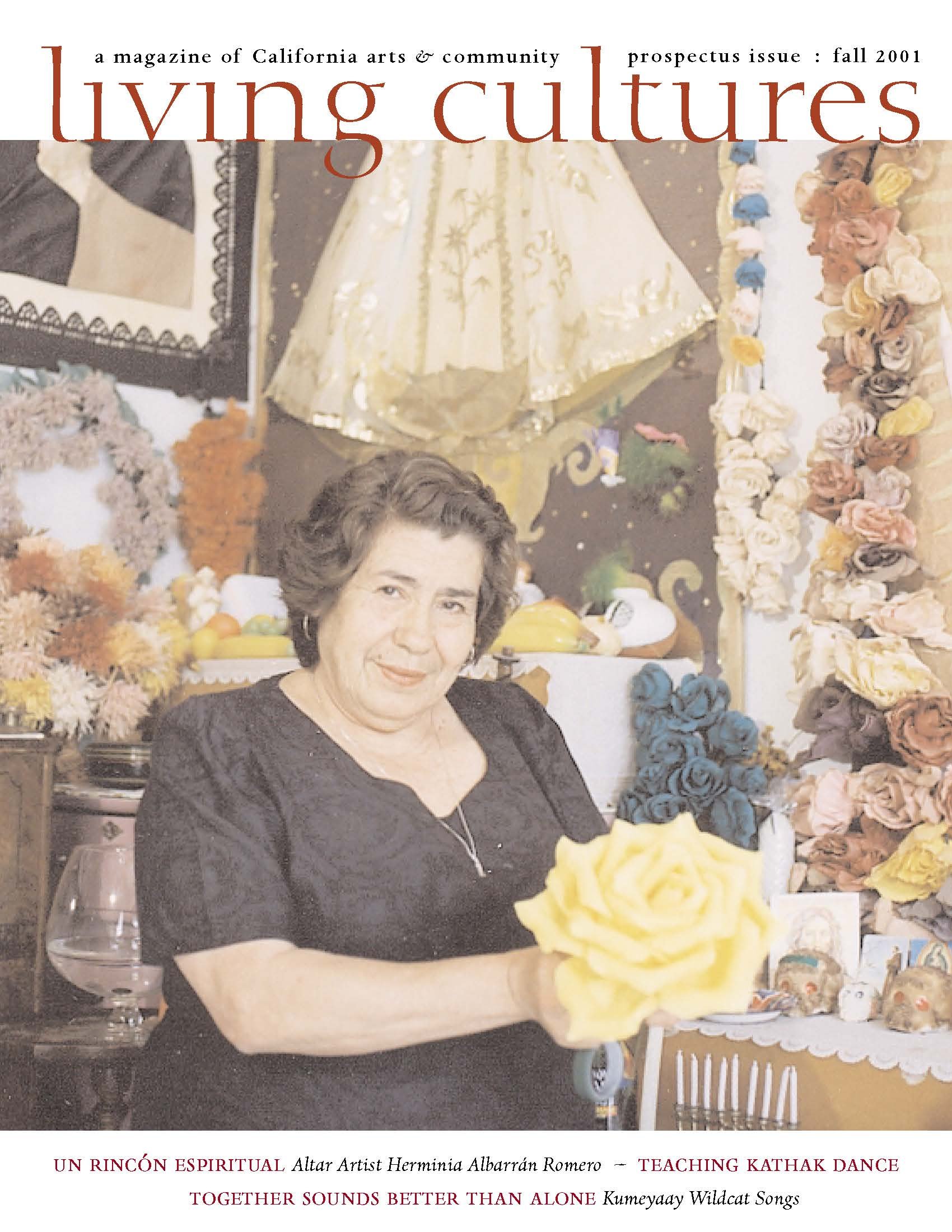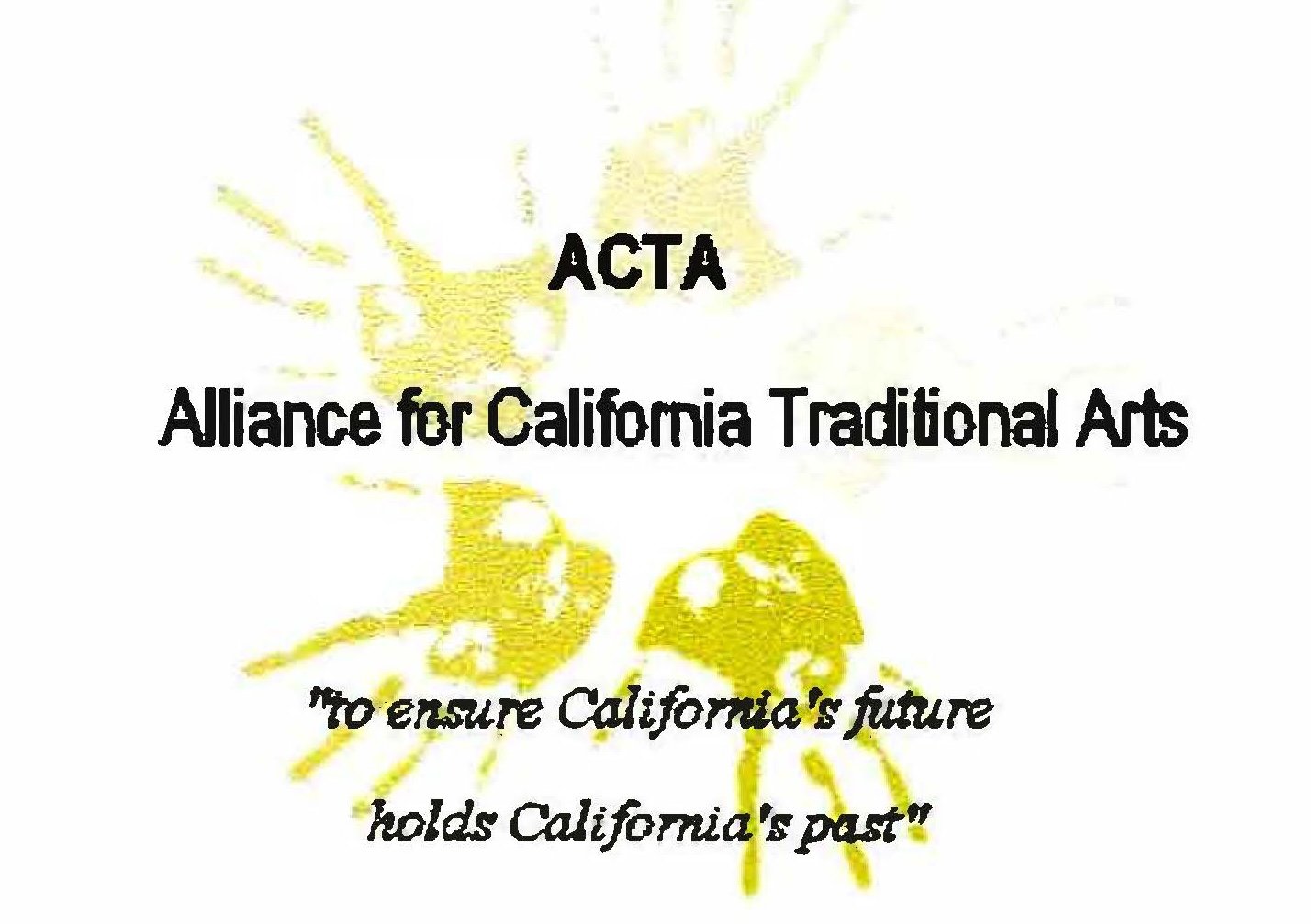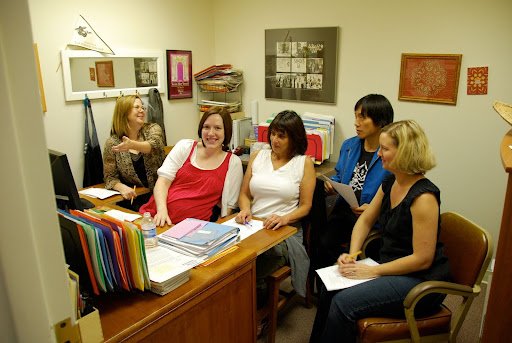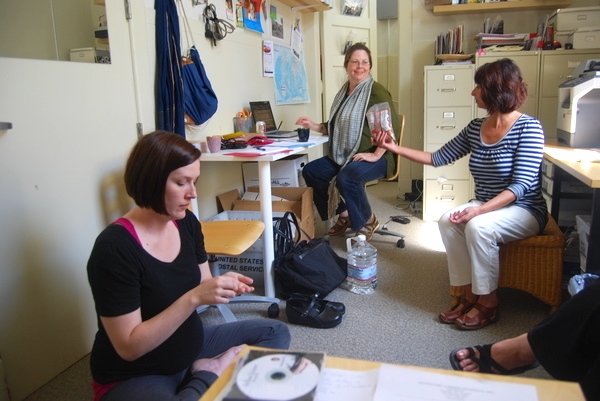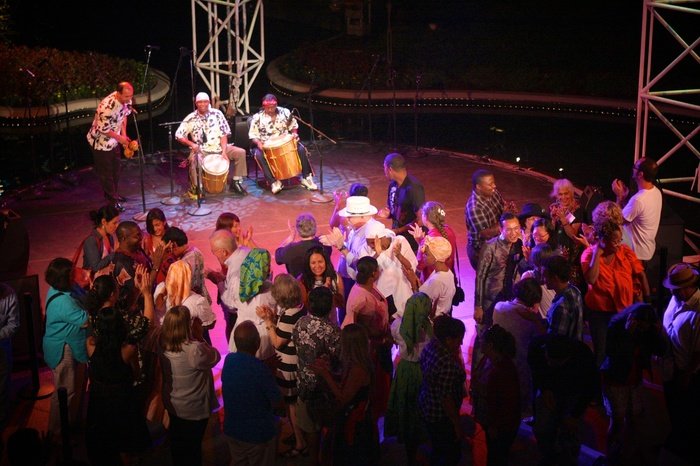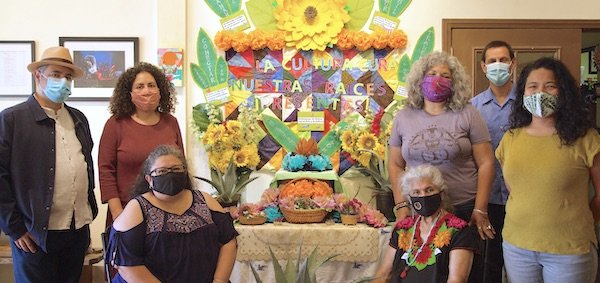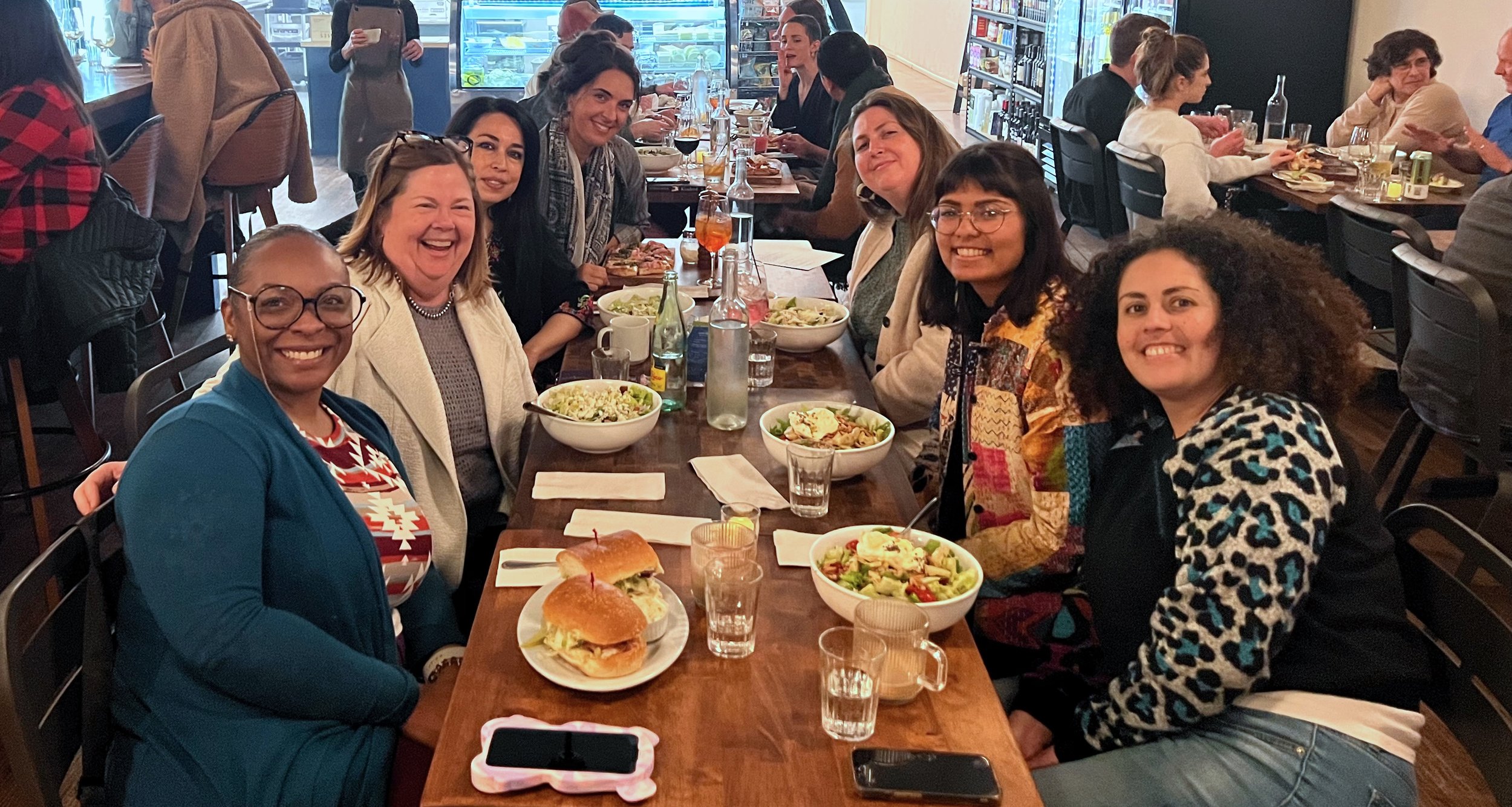Growing ACTA
Over more than 25 years, ACTA has flourished through our collaborations with traditional artists, culture bearers, partners, and organizations across California and beyond. Firmly grounded in a strategic and steadfast commitment to cultural equity, the story of ACTA is marked by many memorable milestones — like expanding our staff, each of whom brings a unique cultural perspective to this work, as we grow to a statewide presence.
About the images featured in this timeline.
“ACTA is born from activism
Born from a synergy of activism and arts practice, a coalition of artists and culture workers recognizes the need for advocacy for traditional artists and culture bearers. In a state rich with Native American traditions and a diverse immigrant population, ACTA emerges to amplify these often overlooked voices. At the biannual Asilomar Conference in January of 1997, hosted by the California Arts Council for its grantees, this coalition identifies the necessity of a statewide support system for folk and traditional artists. Naming themselves the Alliance for California Traditional Arts, they appoint Amy Kitchener, David Roche, and Terry Liu as regional stewards. They establish two priority programs for CAC support: an apprenticeship program to continue the legacy of traditional crafts, and a publication serving as a central information hub for culture bearers. The acronym ACTA, hinting at the Latin imperative “to do,” encapsulates their collective commitment to action.”— 1997
“Three regional coordinators join forces
Coming out of the energy of the Asilomar conference, a powerhouse trio of regional coordinators unites to propel ACTA forward. Folklorist Amy Kitchener, then at the Fresno Arts Council, leads the charge with the Apprenticeship Program, fostering immersive teaching and learning experiences for traditional artists and their apprentices. Ethnomusicologist David Roche, PhD, then in the Bay Area with his organization, local cultures, takes the reins of the publication project, establishing a central hub for culture bearers. Ethnomusicologist Terry Liu, PhD, then at the Public Corporation for the Arts in Long Beach, focuses on strategic fieldwork. This strategy ensures ACTA’s reach to key regions across the state.
”
“Three early funding sources catalyze ACTA
Funding and recognition are formidable tasks for the newly-formed ACTA, led by three young co-founders with ambitions to confront the implicit biases of the entrenched Western canon in a marginalized sector of a field already beset by limited resources. But the California Arts Council (CAC) commits to an initial five-year partnership with ACTA, and goes on to support our regional and statewide initiatives throughout our history. The National Endowment for the Arts (NEA) also recognizes the urgent need for this work, matching the CAC’s funding. The Fund for Folk Culture (FFC) plays a pivotal role by contributing operating funds and staffing. Partnering with the NEA and the CAC, ACTA becomes the official state folklife organization. With money in the bank, it was time to get to work.”
“Amy Kitchener steps up as two co-founders depart
The landscape shifts with Terry Liu’s departure to the National Endowment for the Arts, followed by David Roche’s move to direct the Old Town School of Folk Music in Chicago. At the time, ACTA is a burgeoning project with modest funding, and decisive opportunities for career advancement come to our two professional ethnomusicologists. Amy faces the challenges of implementing the statewide grants, securing funding, and expanding the organization statewide, on her own. At this pivotal juncture, Los Angeles-based folklorist Mary MacGregor-Villarreal, PhD, is contracted to oversee the Apprenticeship Program and more.”
“A dynamic strategic plan provides an innovative model
At a critical crossroads as an organization, Amy Kitchener, along with Bill Coy from La Piana Consulting, convenes stakeholders from across the state to discuss institutional models for sustainability. La Piana recommends ACTA formally incorporate as a nonprofit. This strategic move aims to establish ACTA as an independent statewide entity that centers traditional artists and culture bearers and provides them with direct resources, including funding and technical assistance. The commitment to fostering cultural independence and instilling pride and resilience in communities and individuals, becomes defining characteristics of ACTA and sets the organization apart from many of its peers for decades to come.”
“Incorporating as a non-profit with the State of California
On December 11, 2001, Project Director Amy Kitchener files paperwork to incorporate ACTA as a 501(c)(3) nonprofit with the State of California. Beyond a mere tax-exempt designation, it is a commitment to culture-bearers, the field, and ourselves, that we will work to build a long-lasting, resilient organization that promotes and supports ways for cultural traditions to thrive now and far into the future. ”
“Convening our first Board of Directors meeting
A key value for ACTA’s governance is that our members authentically represent the communities we serve, centering artists and activists of color. Instead of selecting a board primarily based on fundraising capabilities, ACTA decides to lift up practitioners and cultural workers who are at the forefront of new program models. Our initial board meeting marks the beginning of a journey with bright, enthusiastic individuals, many of whom continue to serve on our board 25 years later. This group helps ACTA grow from providing services for the field, such as meetings and survey work, to regranting substantial funds to artists and organizations. The Fund for Folk Culture begins transitioning its portfolio of California grantmaking to ACTA, increasing our impact in the field.”
“Hiring Amy Kitchener as first Executive Director
At ACTA’s first Board meeting, new leadership must be officially appointed. Amy is asked to step out of the room during the Board vote to name our first Executive Director. After a quick and unanimous vote in her favor, the Board has so much excitement chatting amongst each other and about ACTA’s future, that they forget to invite Amy back in for more than half an hour. After sweating it out in the lobby, Amy is thrilled to step into her new role, where she remains decades later. Meanwhile, Charlie Seemann from the Fund for Folk Culture agrees to a six-month tenure as Board Chair. He goes on to lead the Board through ACTA’s first 8 years and remains an active member to this day.”
“Opening our first office in Fresno
ACTA finds its first home as an independent organization in a storage room upstairs from the Fresno Arts Council. Despite the unconventional setting in a parking garage with the daily whirring of cars, we thrive in our humble beginnings. The office expands as we grow – to two tiny offices and a storage room with dated carpeting – and remains our home until an arson fire in 2012 prompts a move to an upgraded office close by in downtown Fresno. Our newly hired Operations Manager Amy Lawrence, Executive Assistant Suzanne Hildebrand, and Arts in Corrections’ coordinator Kenya Curry round out our Fresno team.”
“Expanding into a Bay Area office
ACTA opens a San Francisco office in the Tides Center building in the Presidio, expanding our statewide presence. The new office supports the growth of our Apprenticeship Program and Living Cultures Grant Program and facilitates local outreach and organizational work in the Bay Area and Northern California. Dance ethnologist Lily Kharrazi is hired to steward the Living Cultures grants program; she joins archivist and folklorist Mari Isaacs Pongkhamsing, who manages the Apprenticeship Program. Sherwood Chen, who helps to establish our Traditional Arts Roundtable Series in 2008, also joins the staff.”
“Developing bilingual grant support and outreach
Bilingual outreach specialist Nayamin Martínez joins the team to manage the Traditional Arts Development grants and to advance ACTA’s mission to serve California’s large Spanish-speaking population. ACTA starts providing guidelines and applications in Spanish for core grant programs, and Nayamin coaches numerous new applicants to secure their first grant funding. This critical role is later served by San Jose-based ethnomusicologist Russell Rodriguez, PhD, who continues ACTA’s bilingual support as program manager for the Apprenticeship Program. Our grant applications and much of our educational programming continue to be offered in multiple languages. ”
“Engaging with Southern California through an LA office
Our Southern California office opens in Downtown Los Angeles with an evening of convivial traditional arts and performances by artists drawn from our 15-year history in the region. The new office is co-located with Community Partners at the California Endowment, enabling us to work deeply in several Metro Los Angeles communities, including Little Tokyo, Historic Filipinotown, and MacArthur Park, with significant work in the nearby Boyle Heights community in the decade to come. ”
“A growing staff reflects expansion with support from the Irvine Foundation
The support from the Irvine Foundation’s New California Arts Fund heralds a transformative period of growth for our staff, reflecting ACTA’s expanded programs and services. These resources make possible the hiring of talented staff to work in the areas of development, media, marketing, and accounting. Program expansion includes deep work in communities through our Participatory Cultural Asset Mapping methodology, health and wellness interventions in Boyle Heights, and the introduction of traditional arts teaching artists in correctional facilities. These new programs reinforced the efficacy of traditional arts practices as a way to engage with aggrieved communities.
The staff roster includes Citlalli Chávez and Beto González to grow our Building Healthy Communities and Promise Zone Arts initiatives in Southern California. Patricia Wakida is our first staff member dedicated to development, significantly boosting our fundraising capacity. Crystal Murillo served as executive assistant; Jennifer Joy Jameson Merchant launches new communications efforts, and stewards the Apprenticeship Program; and Sonia Narang focuses on marketing as our first Digital Media Specialist in Los Angeles. In 2018, the team expands further with Mark Herndandez joining as Development Director, Shweta Saraswat-Sullivan taking over as Digital Media Specialist, Antonio Delfino and Jasmin Temblador working on our expanded Arts in Corrections program, Betty Marín coordinating our Promise Zone Arts cultural asset mapping, Julián Carillo managing our Living Cultures grant, and Donna Middleton helping with accounting.”
“Formalizing a Cultural and Racial Equity policy
Cultural and racial equity has been core to ACTA’s mission since our inception. To codify this long-standing commitment, our Board of Directors drafts and adopts a comprehensive Cultural and Racial Equity policy. This policy includes recruiting from underrepresented groups, extending opportunities to incarcerated individuals, and advocating for cultural policies that address challenges faced by African, Latinx, Asian, and Native American communities. This approach underscores our dedication to fostering equity, inclusivity, and cultural diversity, ensuring our commitment is clear to all.”
“Championing employees and artists during the pandemic
We respond to the challenges of the COVID-19 pandemic by hiring over 35 teaching artists in the Arts in Corrections program as employees, to ensure they have health and employment benefits and a safety net. Despite disruptions, we maintain programming online and significantly expand our grantmaking to communities and artists in need. We also support the wider creative workforce through initiatives like the Hardly Strictly Music Relief Fund, which provides 330 grants of $2,000 each to Bay Area roots musicians, prioritizing musicians of color, and facilitating online roundtable sessions on unemployment benefits for artists, and other Pandemic-era resources.Read about accomplishments during the pandemic →
”
“Rallying with the Movement for Black Lives
Amidst nationwide protests against police brutality and systemic racism, we actively participate in and platform the Movement for Black Lives, demonstrating a public commitment to dismantling institutional white supremacy. We partner with the Southwest Folklife Alliance, the National Council for the Traditional Arts, and the Gullah Geechee Cultural Heritage Corridor to host two public dialogues exploring the impact of traditional arts on movements for racial justice and health equity.Watch ‘Building Justice from the Source’ →
”
“Securing a historic investment in traditional arts
Between 2020 and 2022, an unprecedented and historic surge in funding from the CAC and The William & Flora Hewlett Foundation recognizes the field of folk and traditional arts. Hewlett asks ACTA to survey the traditional arts practices of the greater Bay Area and to administer a commissions program marking the largest award of its kind, providing $150,000 grants to traditional artists and culture bearers. A historic $1 million grant to LCGP supports individuals and organizations throughout the state, solidifying trust in our more than 25-year history of relationship-building and work.These funds support our expanding Living Cultures grant, stewarded first by Bay Area Taiko practitioner Melody Takata, and then by Betty Marín.Read more about the Hewlett 50 Art Commissions →
”
“Electing Chike Nwoffiah as our newest Board President
“It continues to be joyful to be part of an organization that is focused on creating a fertile ground for California’s rich and diverse cultures to be activated and celebrated.”
Stockton-based Chike C. Nwoffiah, educator, arts administrator, and advocate, assumes the role as our fourth Board President. With a background in corporate strategy and arts and culture advocacy, Nwoffiah sees traditional arts as a powerful tool for community healing and a pathway to address inequities and racial injustice.
Chike (elected 2022) is the fourth board president in ACTA’s history, following on the heels of:
• Daniel Sheehy, PhD (2013–2022), Bakersfield native, former Director of the Smithsonian Center for Folklife and Cultural Heritage, and former Director of Folk & Traditional Arts at the National Endowment for the Arts;
• Deborah Wong, PhD, (2010–2013) professor of ethnomusicology at UC Riverside and expert in Asian-American and Thai music;
• And our inaugural board president Charlie Seemann (2002–2010), former Executive Director of the Western Folklife Center in Elko, NV.View our history of board members →
”
“ACTA brings on new talent
As ACTA grows, we welcome new staff members. We bring on ethnomusicologist and mariachi musician Leticia Soto Flores, PhD, as our new Development Manager. Fresno-based Nathan Thammavong is our first IT Administrative Specialist, East Bay’s Aliah Najmabadi takes on the Apprenticeship Program, and San Francisco’s Juhi Gupta picks up on content development as the newest Digital Media Specialist. Each brings a wealth of experience, cultural sensitivity, and dedication that serves artists, practitioners, and cultural organizations supported by ACTA.”
“Capturing an oral history to mark over 25 years of ACTA!
In recognition and celebration of our 25th anniversary in January 2022, ACTA embarks on a substantial oral history project documenting over 25 transformative years of the Alliance for California Traditional Arts. We gathered stories from dozens of current and former grantees, staff, board members, partners, and colleagues, and dove into our archives of programming, grantmaking, research, and advocacy to tell the rich story of ACTA through five timelines, celebrating over 25 years and looking to the future of ACTA.”
Timelines At-A-Glance



